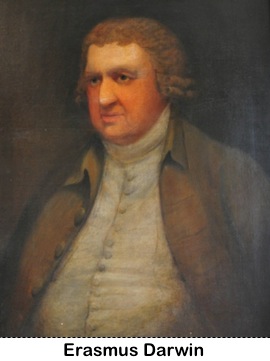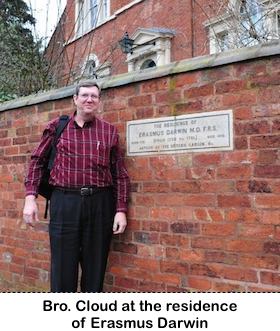866-295-4143, fbns@wayoflife.org

A major part of this vein was Charles’ paternal grandfather, ERASMUS (1731-1802). He was a materialist who denied the soul of man and taught that “all mental states derive from the motion of particles in the brain.” He “discarded the Bible and Jesus” and “adored in the Temple of Nature; for him Reason was divine, and Progress its prophet” (Adrian Desmond, Darwin, pp. 5, 9).
Erasmus was a tremendously influential man, a pioneering medical doctor, poet, philosopher, naturalist, and inventor. He “was generally regarded as the leading English poet of the time” (Desmond King-Hele, Erasmus Darwin, p. 264). Nora Barlow says, “Today it is difficult to realise the immense vogue Erasmus Darwin’s works once possessed” (The Autobiography of Charles Darwin edited by Barlow, p. 150). He invented a speaking machine, a copying machine, and the steering mechanism used in modern cars. His close friends consisted of men such as Benjamin Franklin, one of America’s founding fathers; John Michell, the father of seismology; John Whitehurst, inventor of the factory time clock; John Baskerville, famous printer and type font designer; James Watt, perfecter of the steam engine; and James Brindley, creator of England’s canal system. Erasmus was a Fellow of the Royal Society, the first in a line of six generations of Darwins to be so honored. In science, Erasmus was ahead of his time, having a basic understanding of such things as oxygen, cloud formation, oxygenation of the blood, and photosynthesis.
Erasmus’ first wife, Polly, the mother of Charles Darwin’s father, Robert, was non-religious in a religious age, and she “faced death calmly without supernatural assistance” (King-Hele, p. 94).
Erasmus was a moral scoundrel who was “fond of sacrificing to both Bacchus and Venus” (p. 18), meaning he loved alcohol and women. Though he gave up drinking for his health’s sake, he continued to sacrifice to Venus throughout his life. After the death of Polly, Erasmus bore two daughters out of wedlock with his live-in governess, who was 22 years his junior. He also composed lush erotic verse” (Desmond, p. 6).
Erasmus’ god was a First Cause that had some vague role in bringing life into existence but had no role in men’s lives. Rejecting the true and living God, Erasmus worshipped “a distant Deity ... the vast Unknown.” He had rejected the Christian view of God by his student years at Cambridge. At age 23 he referred to God as a Being who had no role in the affairs of men (King-Hele, p. 17). At Cambridge, he was deeply influenced to Deism by Albert Reimarus, the son of German philosopher Hermann Reimarus. At age 37 Erasmus wrote to Albert and said that he was continuing “in the Religion you taught us.”
In the second volume of Zoonomia, Erasmus identified religion and hell as psychological diseases.
One of these supposed afflictions was named “spes religiosa” or “superstitious hope.” He called this a “maniacal hallucination,” an insanity that has produced “cruelties, murders, massacres” into the world. Thus, Erasmus Darwin, the God hater who did not distinguish false religion from true, predated the so-called “new atheists” like Richard Dawkins by more than two centuries.
Another alleged psychological disease that Erasmus identified was “orci timor” or “the fear of hell.” He wrote, “Many theatric preachers among the Methodists successfully inspire this terror, and live comfortably upon the folly of their hearers” (Zoonomina, Vol. 2, p 379). Erasmus implied that all preachers of hell are hypocrites who preach for money, which is patently false. Jesus Christ preached about hell, for the very reason that hell is a reality and He came to earth to save men from the punishment that they deserve. Jesus certainly didn’t live comfortably. His payment for speaking the truth in love was the cross. The only payment that Jesus’ disciples received for warning men to flee hell through faith in Christ was persecution and death. The same has been true for countless other Bible preachers in the two millennia since. The founders of Methodism certainly did not preach for money; they were hounded and persecuted by the established church. Erasmus Darwin was a slanderer of Bible preachers.
After his death, an obituary in the Monthly Magazine stated that Erasmus told a friend “let us not hear anything about hell.”

Erasmus believed in the evolution of life from an original microscopic biological speck to man. His family coat of arms consisted of three scallop shells with the motto E conchis omnia or “everything from shells.” This referred to the evolution of life from the sea.
Erasmus was influenced by his friend James Hutton’s view of long geological ages and uniformitarianism (King-Hele, p. 245). Without this doctrine, the theory of evolution would not be possible.
Erasmus preached his doctrine of evolution in a popular two-volume set of books entitled Zoonomia; or, the Laws of Organic Life (1794-96). The books went through many editions in England and America, with translations into German, Italian, French, and Portuguese.
Zoonomia promotes the very concepts later popularized by Charles Darwin: natural selection, survival of the fittest, sexual selection, gradual transformation of species, homology, and vestigial organs. Erasmus believed that everything has risen from an original “living filament.” He wrote:
“Would it be too bold to imagine, that in the great length of time since the earth began to exist, perhaps millions of ages before the commencement of the history of mankind, would it be too bold to imagine, that all warm-blooded animals have arisen from one living filament, which THE GREAT FIRST CAUSE endued with animality, with the power of acquiring new parts, attended with new propensities, directed by irritations, sensations, volitions, and associations; and thus possessing the faculty of continuing to improve by its own inherent activity, and of delivering down those improvements by generation to its posterity, world without end!” (Zoonomia, Vol. 2, p. 240).
Erasmus believed that the original “living filament” formed by “spontaneous vitality” in “the primeval ocean.”
Erasmus Darwin’s book The Temple of Nature was published the year following his death. It presents the doctrine of evolution under the guise of lessons he supposedly learned from the goddess Urania, Priestess of Nature.
Ere Time began, from flaming Chaos hurl’d
Rose the bright spheres, which form the circling world ...
Nurs’d by warm sun-beams in primeval caves,
Organic Life began beneath the waves. ...
Hence without parent by spontaneous birth
Rise the first specks of animated earth;
From Nature’s womb the plant or insect swims,
And buds or breathes, with microscopic limbs. ...
New powers acquire, and larger limbs assume;
Whence countless groups of vegetation spring,
And breathing realms of fin, and feet, and wing.
Erasmus Darwin borrowed from ancient paganism, which came from the Devil himself. Darwin thought of himself as a free thinker, but his religion was nothing more than ancient goddess-earth worship.
Erasmus’ skepticism was so radical that it even shocked the Unitarian transcendentalist Samuel Taylor Coleridge, who called him “an Atheist.” Coleridge described Erasmus’ doctrine as “the Orang Outang theology of the human race” (“Charles Darwin and His Grandfather,” The Autobiography of Charles Darwin edited by Nora Barlow, p. 151).
For his part, Erasmus called Unitarianism a featherbed to catch a falling Christian. Unitarianism had begun a centuries earlier as a denial of the Trinity, “but by Darwin’s time it had become the church for the smart-set, who were smugly certain that the Bible was merely one more book of ancient mythology” (Wiker, The Darwin Myth, p. 16).
Erasmus was a close associate of Unitarian Christ-denier Joseph Priestley (though Priestly condemned Darwin’s evolutionary thinking), the French Deist Voltaire, and other skeptics who rejected divine Revelation. One of his closest friends was the Unitarian Josiah Wedgwood, the grandfather of Charles Darwin’s wife. Wedgwood was a disciple of Joseph Priestly, who preached in Birmingham until he was driven out in 1791 by a mob opposed to his skepticism and radical socialistic politics. Josiah’s famous Wedgwood pottery firm even honored Priestly with a medallion featuring his likeness.
The two grandfathers bequeathed “a mixture of freethought and radical Christianity to their grandchildren” (Desmond, Darwin, p. 5).
Erasmus died seven years before Charles’ birth, but the grandson read Zoonomia twice in his youth (The Autobiography of Charles Darwin, p. 49).
“Belief in evolution, passed on to his son Robert and reincarnated in his grandson Charles, can be seen as the finest of Erasmus’s legacies” (Desmond King-Hele, p. 363).
- Receive these reports by email
- www.wayoflife.org
______________________
Sharing Policy: Much of our material is available for free, such as the hundreds of articles at the Way of Life web site. Other items we sell to help fund our expensive literature and foreign church planting ministries. Way of Life's content falls into two categories: sharable and non-sharable. Things that we encourage you to share include the audio sermons, O Timothy magazine, FBIS articles, and the free eVideos and free eBooks. You are welcome to make copies of these at your own expense and share them with friends and family. You may also post parts of reports and/or entire reports to websites, blogs, etc as long as you give proper credit (citation). A link to the original report is very much appreciated as the reports are frequently updated and/or expanded. Things we do not want copied and distributed are "Store" items like the Fundamental Baptist Digital Library, print editions of our books, electronic editions of the books that we sell, the videos that we sell, etc. The items have taken years to produce at enormous expense in time and money, and we use the income from sales to help fund the ministry. We trust that your Christian honesty will preserve the integrity of this policy. "For the scripture saith, Thou shalt not muzzle the ox that treadeth out the corn. And, The labourer is worthy of his reward" (1 Timothy 5:18). Questions? support@wayoflife.org
Goal:Distributed by Way of Life Literature Inc., the Fundamental Baptist Information Service is an e-mail posting for Bible-believing Christians. Established in 1974, Way of Life Literature is a fundamental Baptist preaching and publishing ministry based in Bethel Baptist Church, London, Ontario, of which Wilbert Unger is the founding Pastor. Brother Cloud lives in South Asia where he has been a church planting missionary since 1979. Our primary goal with the FBIS is to provide material to assist preachers in the edification and protection of the churches.
Offering: Offerings are welcome if you care to make one. If you have been helped and/or blessed by our material offerings can be mailed or made online with with Visa, Mastercard, Discover, or Paypal. For information see: www.wayoflife.org/about/makeanoffering.html.





